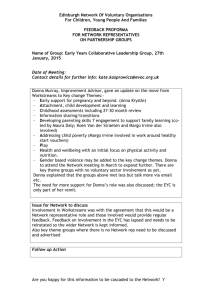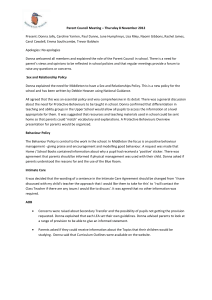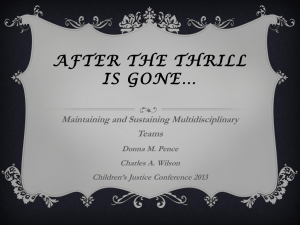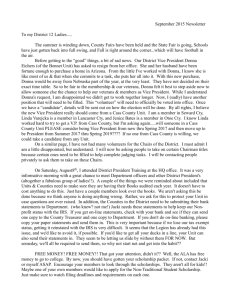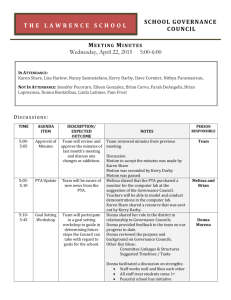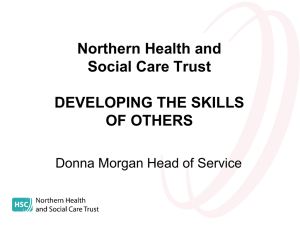homework assignment
advertisement
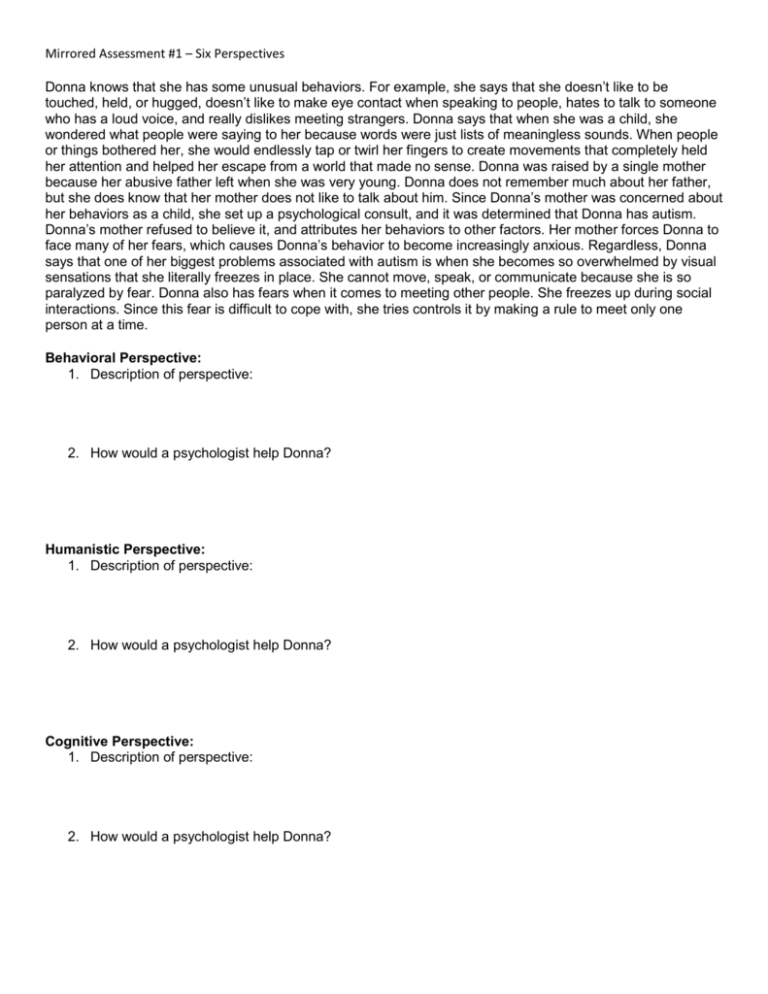
Mirrored Assessment #1 – Six Perspectives Donna knows that she has some unusual behaviors. For example, she says that she doesn’t like to be touched, held, or hugged, doesn’t like to make eye contact when speaking to people, hates to talk to someone who has a loud voice, and really dislikes meeting strangers. Donna says that when she was a child, she wondered what people were saying to her because words were just lists of meaningless sounds. When people or things bothered her, she would endlessly tap or twirl her fingers to create movements that completely held her attention and helped her escape from a world that made no sense. Donna was raised by a single mother because her abusive father left when she was very young. Donna does not remember much about her father, but she does know that her mother does not like to talk about him. Since Donna’s mother was concerned about her behaviors as a child, she set up a psychological consult, and it was determined that Donna has autism. Donna’s mother refused to believe it, and attributes her behaviors to other factors. Her mother forces Donna to face many of her fears, which causes Donna’s behavior to become increasingly anxious. Regardless, Donna says that one of her biggest problems associated with autism is when she becomes so overwhelmed by visual sensations that she literally freezes in place. She cannot move, speak, or communicate because she is so paralyzed by fear. Donna also has fears when it comes to meeting other people. She freezes up during social interactions. Since this fear is difficult to cope with, she tries controls it by making a rule to meet only one person at a time. Behavioral Perspective: 1. Description of perspective: 2. How would a psychologist help Donna? Humanistic Perspective: 1. Description of perspective: 2. How would a psychologist help Donna? Cognitive Perspective: 1. Description of perspective: 2. How would a psychologist help Donna? Mirrored Assessment #1 – Six Perspectives Biological Perspective: 1. Description of perspective: 2. How would a psychologist help Donna? Social-Cultural Perspective: 1. Description of perspective: 2. How would a psychologist help Donna? Psychodynamic Perspective: 1. Description of perspective: 2. How would a psychologist help Donna? Mirrored Assessment #1 – Six Perspectives Case Study Rubric -- Mirrored Assessment (Donna) *2 points per perspective (12 total points; 6 perspectives) Point 1: Define the perspective effectively Point 2: Explain what a psychologist from the selected perspective might recommend to improve the subject’s behavior Behavioral Perspective: Point 1: The behavioral perspective explains behavior based on learned or observed experiences. Should be a direct connection to rewards and punishments to earn the point. Point 2: Donna has learned that rubbing her fingers together when she is anxious will calm her tensions and make her feel better. A behavioral psychologist would recommend Donna be rewarded for pursuing behaviors that teach her to feel better in social situations, such as rubbing her fingers together. Humanistic Perspective: Point 1: The humanistic perspective explains behavior by attributing actions to the attempt to fulfill basic needs and personal potential; the individual has great control of their life. Answer could also reference an imbalance of basic needs. Point 2: Donna is lacking her social needs from her family as her mother forces her to participate in therapy sessions that she hates attending. It makes her feel like her mother doesn’t love her. An additional response could be that Donna isn’t reaching her full potential because she refuses to try new things around new people. A psychologist would recommend she works to achieve the social level on the hierarchy of needs. Biological Perspective: Point 1: The biological perspective explains behavior by attributing actions to chemical imbalances, inherited conditions, genetics, or brain deformities. Some connection MUST be made to the biological composition of the brain to score the point. Point 2: Donna’s autism is a result of the biological perspective, so a psychologist would recommend medication to alter her brain’s chemistry Cognitive Perspective: Point 1: The cognitive perspective explains behavior through personal perception and individual mental processes. Focus and outlook are unique to each individual. Point 2: A psychologist would say that Donna needs to accept a more positive outlook on social situations rather than dreading being around other people on a regular basis. Student must mention a personal shift of outlook to score the point. Social-cultural Perspective: Point 1: The social-culture perspective explains that behavior originates from social settings, societal expectations, cultural roles, and family goals. Point 2: Donna dreads being around people because she has spent most of her life alone, separated from her father, and under the watchful eye of her mother. Student can also make a connection to her dislike for her father stemming from her mother’s constant disapproval of him, making it a social expectation. A psychologist would recommend Donna be placed in a more supportive environment with more realistic expectations. Psychodynamic Perspective: Point 1: The psychodynamic perspective states that behaviors and personality derive from childhood experiences that have been repressed and influence daily life. Point 2: A psychologist would argue that Donna’s erratic behavior is influenced by the abandonment of her father, therefore indicating she would benefit from therapy to discuss the event in detail. Mirrored Assessment #1 – Six Perspectives
